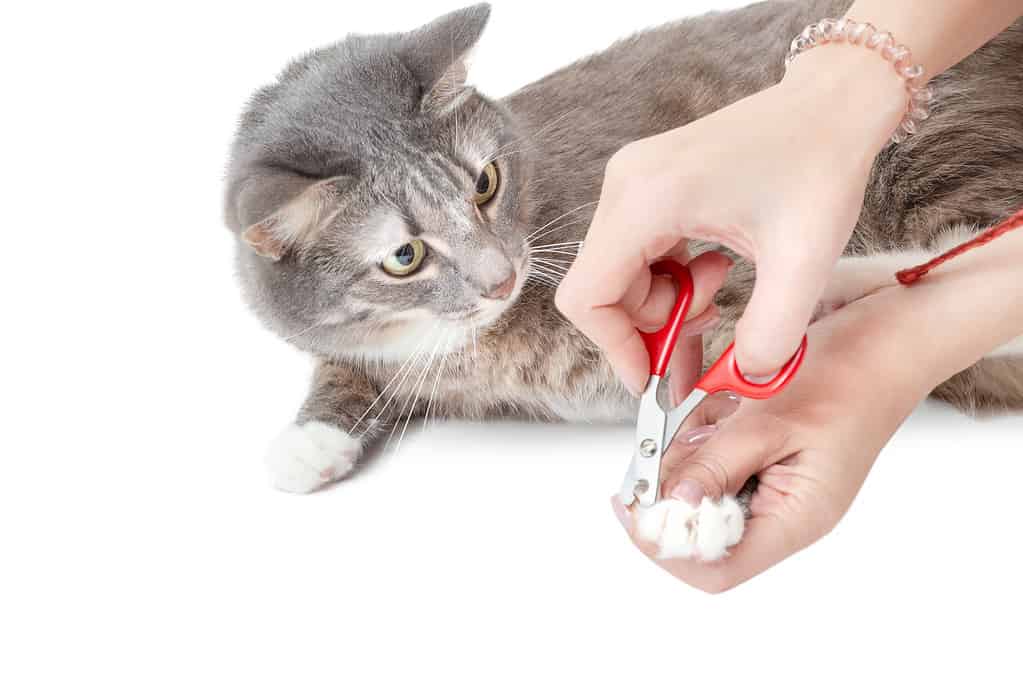Birman cats have extremely luxurious fur. Luckily, though, they aren’t that high-maintenance. Unlike many other cat breeds, they don’t require much brushing and do a very good job of keeping themselves clean.
However, that doesn’t mean you can skip grooming altogether. It’s important to stay on top of what grooming they require.
Here’s exactly how you need to groom your Birman cat:
1. Brushing

Despite their long fur, these cats don’t require that much grooming.
©Liudmila Chernetska/Shutterstock.com
Brushing is the most important grooming step we’ll recommend in this article. Birman cats require brushing once or twice a week. You may need to increase this frequency during shedding season, though, when your cat may have more loose fur than usual.
The primary reason you’re brushing your feline is to remove loose fur and prevent matting. While these cats aren’t particularly prone to matting, it can absolutely happen. Getting mats out can be nearly impossible, so preventing them is vital.
Use a fine-toothed comb to gently remove tangles. May particular attention to the areas that are prone to matting, such as around your cat’s collar. After combing out all of the tangles, use a slicker brush to remove loose fur and dirt.
Like most cats, Birman cats are very good at keeping themselves clean. However, they can consume cat fur when they clean themselves. If they consume too much, it can create hairballs (or even a deadly impaction, which requires surgery). Therefore, it’s vital to stay on top of your brushing routine.
Always brush in the direction of your cat’s fur, starting from the head and working your way down. You don’t want to push loose fur into an area you’ve already brushed. Think of it a bit like sweeping.
Be extra gentle around your cat’s stomach and legs. These areas do need to be brushed, as they can tangle easily. However, many cats find these areas extra-sensitive.
2. Bathing

It’s normal for kittens to be less successful at cleaning themselves than an adult cat. However, if your cat is having serious trouble, speak with your vet.
©Wirestock/iStock via Getty Images
Birman cats typically do not require bathing. Like with most breeds, you don’t need to schedule this into your weekly or monthly routine.
However, there are some occasions when your cat may need to be bathed. Kittens are not as good at cleaning themselves as older cats. Cleaning is a learned behavior that kittens pick up from their mother. They don’t innately know how to do it. Therefore, it takes some practice before they become very good.
You may need to occasionally bathe your kitten if you notice they’re dirty. Because kittens are so small, they can become too cold easily. It’s important to use warm water and bathe in a warm room. Use shampoo designed for kittens specifically, as they are often more sensitive than older cats.
Senior cats may have a harder time grooming themselves, usually due to joint pain. In this case, you may have to bathe your older cat occasionally. Again, use a gentle shampoo and ensure your cat stays warm during the bath.
If you notice your feline isn’t grooming themselves properly, you should speak to your vet. Obese Birman cats may have a harder time grooming themselves – a clear sign that they need to lose weight.
Other health issues can prevent grooming, too. A vet can help make a diagnosis and treatment plan.
3. Nail Trimming

Trimming your cat’s nails is highly recommended to prevent painful injuries.
©frantic00/iStock via Getty Images
You should trim your cat’s nails regularly. Nail trimming helps prevent your cat’s nails from becoming too long. Too long nails can cause excessive damage to your furniture and carpets. Plus, longer nails are more likely to become snagged and split.
Nail injuries can be very painful, and you often can’t do much for them. Plus, because nails are on your cat’s feet, they are very prone to becoming infected when injured.
You can use nail clippers designed for cats or a grinder. Both work well, but they may require some practice. Your feline may also need to be desensitized to the process. It’s best to start young and get your feline used to nail trimming before they’re an adult.
4. Ear Cleaning

If you believe your cat has an ear infection, visit your vet right away.
©cyano66/iStock via Getty Images
Birmans aren’t particularly prone to ear infections. However, that doesn’t mean they can’t get them. Dirty ears can quickly lead to bacterial and yeast infections, which require treatment from your vet.
You can’t always prevent ear infections. However, keeping your cat’s ears clean is an easy way to prevent as many as possible.
Not all cats need their ears cleaned all the time. We recommend checking your cat’s ears weekly for dirt and wax buildup. If you see any wax or debris, use a wet cotton ball to clean the parts of your cat’s ears that you can see. Don’t shove anything into your cat’s ears, as this can damage their hearing.
When in doubt, always speak to your vet. Some Birmans will have particularly dirty ears or reoccurring ear infections. In this case, your vet may recommend a pet ear cleaner and a regular ear cleaning routine.
The photo featured at the top of this post is © bru_greg/iStock via Getty Images
Thank you for reading! Have some feedback for us? Contact the AZ Animals editorial team.







